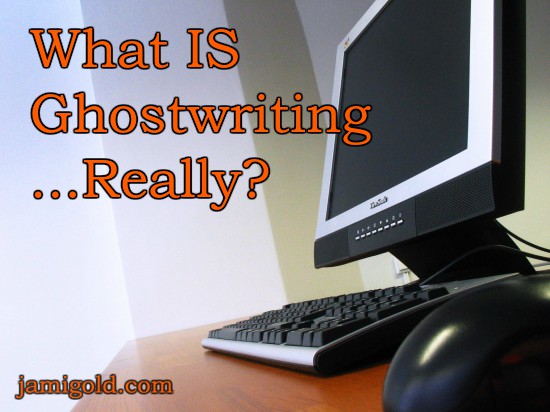In the week since news of the #CopyPasteCris plagiarism scandal hit the writing world (51 books, 34 authors, 3 articles, 3 websites, 2 recipes and counting!), two topics beyond the extreme plagiarism have gained attention:
- Authors and readers are frustrated with Amazon.
As I mentioned in my last post, Amazon could be doing so much more to prevent the scammer invasion but they choose not to. And given what I’ve seen lately with counterfeit products in non-book listings, scammers have invaded every corner of their store, from bluetooth earbuds to hair conditioner, so I doubt they’ll prioritize cleaning up the ebook mess anytime soon. - Ghostwriting has come under fire with complex questions from many sides.
The plagiarist, Cristiane Serruya, blamed her ghostwriter, which led to the whole ghostwriting profession being targeted. The evidence gives every reason to doubt her claim (as I mentioned last week), but even if it were true, that “ghostwriter” would be a scammer and not a professional ghostwriter, and Cristiane would still be responsible for messing up—this time as the employer of a ghostwriter.
For the first issue, many have written better summaries of the problems with Amazon and how scammers game their systems, so I’ll just leave those links here (David Gaughran, Susan Tisdale, Dakota Willink, Twitter Moment). Instead, today we’re going to dig into ghostwriting.
To start, let’s make it clear that authors on Kindle Unlimited aren’t the problem. Readers who like to buy cheap books aren’t the problem. Ghostwriting and ghostwriters aren’t the problem. The problem is with Amazon, who doesn’t fix their broken systems, and those who manipulate the systems and exploit the weaknesses.
Even though the #CopyPasteCris case is about plagiarism and not ghostwriting, more authors and readers now know that ghostwriters exist for fiction, and that attention has placed a target on the profession. That attention is mostly negative, to some extent because most of us learned about ghostwriting due to celebrity books.
So there are a lot of assumptions about ghostwriters and the authors who hire them that might not apply to other situations. Common assumptions include:
- “If ghostwriters were any good, they’d be published as themselves.”
- “If ghostwriters were proud of their work, they’d want their name on it.”
- “Ghostwriting is always exploitative. It’s like stealing.”
- “Everyone who uses ghostwriters is a scammer—or a fraud.”
Yes, there are valid questions readers and other writers can ask about the use of ghostwriters, but rather than continue the conversation with only our assumptions, I invited award-winning author and ghostwriter Shiloh Walker to help us understand some of the basic facts first. She’s here to explain the hows—how writers would start in the career—and the whys—such as why authors would turn to ghostwriters.
Please welcome Shiloh Walker! *smile*
*****
All About Professional Ghostwriters:
The How and the Why
By Shiloh Walker
Hello, everybody. I’m Shiloh and I’m an…wait. Wrong group. Okay, hey, I’m Shiloh Walker, also known as J.C. Daniels. I’m also a ghostwriter and I’m going to talk HOW & WHY.
But…before I start…let me preface this entire thing with this:
I’m talking about the practice of professional ghostwriting.
Professional ghosts don’t write for author mills or book packagers who churn out book after book after book on KU, week after week after week for months on end.
Quality work comes at price and author mills and book packagers are predatory practices. The two don’t mix.
How: Starting Down the Ghosting Path
I got started ghostwriting several years ago after one of my longtime publishers, Ellora’s Cave, went belly up. EC paid monthly and although the funds steadily declined, especially those last couple of years, it was still steady, monthly money. About the time they were going under, my other digital publisher, Samhain, started showing signs of trouble, and my gut told me there was change coming so, being determined to keep writing for a living, I started considering options.
I’ve mentioned it on Twitter, but as most writers know, writing is not an easy field. In my former life, I was a nurse, but I’ve been out of that so long, I’d be starting over practically from scratch. Plus I have health issues now that would make it rather problematic, so I’d rather not go back to the field unless I have no other choice. It would also leave far, far less time for writing, because frankly…I’m not the chick I was twenty years when I was burning the midnight oil, working all day and then writing until the wee hours.
Basically, my options, as I saw it were…writing and writing. Some authors edit on the side, some design covers, etc. Me? I’d be a lousy editor and I’d also probably make people cry if I did edit. But I can write like hell and damn most days.
Freelance writing seemed to be a viable answer. In particular…ghostwriting.
How Do You Learn More about Ghosting?
I’ve always written fast and clean, which a friend had once mentioned was key when it came to ghostwriting. That friend, aka Paperback Writer, had discussed her ghostwriting career fairly openly—or as openly as one can without breaking her non-disclosure agreements (NDAs)—on her blog before.
My friend is also a writer whom I’ve long since admired, one of the few I’ve sent actual fan mail to. I emailed her a year or so before I sold my first book, gushing over her Stardoc series.
As a recovering nurse, I have a hate/hate affair with almost any book with medical anything in it. Too many are written by people with no knowledge of the medical profession and too many can’t be bothered to do any more researching than watching a few seasons of ER.
This results in things like people having sex in the hospital…gross, MRSA…talking about patients in the elevator or cafeteria…BIG NO-NOS, fines, and could be looking at jail time because of privacy laws. All of these thoughts interfere with my enjoyment of most books with medical aspects, unless the book is written by somebody with medical know-how, or I can trust that writer did their homework, instead of just watching ER.
I’d emailed my friend after reading Stardoc, the first in her series about a doctor, set a few hundred years in the future, and it was so unbelievably believable as far as the medical aspects went. I could see the medical aspects working, even on alien creatures that I can’t imagine existing in my wildest dreams. I emailed her, gushing, and she kindly responded to my dorkish praise. We developed a relationship from there.
When I realized I was going to need to find another form of writing if I wanted to…well, keep writing, ghosting came to mind and I reached out to her. We talked a bit. She made a few recommendations.
How Does Having a Mentor Help with Ghosting?
While nothing directly panned out from those recs, I did end up getting my first couple of jobs from the sites she’d pointed out to me—not the jobs she’d initially mentioned, but others.
She also gave some suggestions on what to avoid, what to look out for, what I needed to do to protect myself and that sort of thing. We talked about wages, although not specific amounts. We talked about contracts—you need one to protect yourself. We talked about non-disclosure agreements, which protect your author—the one who hires you, and yourself, just as much.
Off and on throughout the first year, I’d email her when I had questions or concerns, like when I was asked to write something I felt was just…wrong. Not unethical, but the storyline, in my head, I couldn’t see how to make it cohesive and believable with my particular background. She advised me how to handle it.
By the time the first year was up, I’d developed a short list of regular clients and I’m still writing fairly regularly for those same people.
That covers one question that comes up a lot—how somebody gets into ghostwriting.
Why: All the Whys behind Ghostwriting
The other thing that’s a big question in the minds of many when it comes to ghosting is why, but it’s not just one why…it’s a bunch of them.
Why do people hire ghostwriters…I mean, other than celebrities?
- Why would an already published writer use a ghostwriter? Why would any writer use a ghostwriter?
- Why would a writer choose to ghostwrite?
- Why wouldn’t a writer want credit for their work?
I think that covers most of the whys, although I’m sure there are a few others floating around.
Why Do People Other than Celebrities Hire Ghostwriters?
I think most people realize by now that most celebs, political figures, etc. don’t really write their biographies. They sit for interviews, offer insight, that sort of thing, and a ghostwriter does the rest.
But why would other people do it? Setting aside the writers who choose to use ghostwriters for technical books, political biographies, memoirs, etc., let’s focus on people who have stories.
Does hiring a ghost mean you're not a real writer? Let's add nuance to the #CopyPasteCris debate — by @shilohwalker Click To TweetSome people have an incredible story to tell. Maybe a true one, maybe one inspired by true events, or maybe one that’s just a crazy yarn. They’ve tried to write it down, but no matter how hard they try, they can’t get it right.
How many of us writers have had people say, You know…I’ve always wanted to write a book?
I’ve lost track. My usual response is What’s stopping you?
Most people, easily eighteen out of twenty (yes, I know there’s another way to break that down, but bear with me) just mumble and shrug it off. These are people I’ve come to realize like the idea of writing, but the actual doing it? Not so appealing.
Then there’s one who’ll start the idea and lose interest.
But there’s one who will start, and restart, and restart, and just keep plugging away but they can’t get it right. The words come out mechanical. They take class after class, workshop after workshop. They’ve got the plot, the characters, everything down the synopsis done, sometimes even the bare bones of a rough draft. Like the skeleton of a book. But they can’t flesh it out.
They’ve still got the idea of a story. They’ve done a lot of the work. But they can’t see it completed because they’re missing a crucial part. This person is already a writer and they’ve worked hard.
That’s where a ghostwriting can come handy—a ghost can come in, help fill in the colors of the sketch the writer created.
Why Would a Writer Choose to Ghostwrite?
- The basic answer is money.
The writing field is fricking hard and it’s not getting any easier. For those who write fast and can adapt to different writing styles, freelancing or ghostwriting provides another source of income.
- Some writers enjoy the process of writing, but not everything else that’s involved.
I’ll again bring up my ghostwriting friend. In the linked post, she talks about the independence she found after finally going to straight freelance/ghostwriting after doing both traditional and freelance/ghostwriting for years.
She’s never been one for enjoying the promotional aspects of writing, social media, etc. There are a number of writers out there who struggle with those things, especially the social media aspects which can be hard on any extreme introvert, but some struggle more than others. With ghostwriting, people who just want to write can do just that.
- Another reason? Personally? Being in a rut or stuck in a block.
In 2017, one of my brothers committed suicide and I couldn’t write for me for several months. It actually turned out to be my first real case of writer’s block and I just finally got through it in the summer of 2018. But my ghostwriting proved to be an outlet. Sometimes, it was nothing more than a paycheck, yes.
I was dealing with the worst depression of my life. Having a reason not to go back to bed after my husband left for work and the kids were at school was important.
Why Wouldn’t a Writer Want Credit for Their Work?
The entire idea behind a true, legit, ethical ghostwriting deal is that the GW gets solid financial compensation in exchange for surrendering the copyright to the work.
Are ghostwriters exploited if they don't get credit? Let's add nuance to the #CopyPasteCris debate — by @shilohwalker Click To TweetKeep in mind that the agreement is (or it should be) made ahead of time, and the ghost knows, going in, that the work they are creating is not theirs.
If the ghost wants acknowledgement, they should ask for it.
But for most professional ghosts? This isn’t an issue. If we’re paid well and treated well, that is the credit we want.
Some specifically do not want to be credited, while others are fine with not being credited—that was the arrangement agreed upon up front.
Examples below to a thread on Twitter:
I do some freelance ghostwriting and it’s not plagiarism. It’s honest work and we understand that it is not our property – we are the doers to their visionaries. Cris is pure plagiarism, claiming something as hers without any legal papers saying that it is.
— ?? MHS Graves ? (@oroplatamyta) February 20, 2019
Ghostwriters can work on just about anything. Some people have great ideas, but lack the ability to put it down on paper in a meaningful way. The work is still their ideas and knowledge, they just need someone to make it readable. @johnpwriter , want to weigh in on this?
— Eldred Bird (@EldredBird) February 19, 2019
Professional Ghostwriting Isn’t Exploitation
There are some who ghost on the side, like I do. Some are already published authors, but they write in a very different genre from the fields they ghost in and they’d rather not cross the streams, so to speak.
There are also writers, who like my friend, are happy to write in the background.
When it comes down to the whys, it should really boil down to these simple Qs, in my opinion:
- Is the ghostwriter well compensated?
- Is the ghostwriter treated well?
That’s up to the ghost to decide, but usually, it shows in the work.
Quality work comes with a price.
You do, after all, get what you pay for.
*****
 Shiloh Walker is an award-winning writer…yes, really! She’s also a mom, a wife, a reader, and she pretends to be an amateur photographer.
Shiloh Walker is an award-winning writer…yes, really! She’s also a mom, a wife, a reader, and she pretends to be an amateur photographer.
She published her first book in 2003. Her latest suspense, Cocksure, released in November 2018, was inspired by one of the big book dramas of 2018, COCKYGATE. You can read about Shiloh’s cocky (yes, we can use that word now) hero in book digital and print.
Read more at her website & join her newsletter for a chance to enter the monthly giveaway. She also writes romantic suspense and contemporary romance, and urban fantasy under the name J.C. Daniels.
Shiloh’s Website | J.C. Daniels’s Website | Twitter | Facebook
*****
About Cocksure:
 Sabrina: He’s the cockiest bastard I’ve ever met and I mean that with all the affection and adoration in the world. I’ve been in love with him for years, and not just because of those intense blue eyes or that slow smug smile that promises to make all your dreams come true.
Sabrina: He’s the cockiest bastard I’ve ever met and I mean that with all the affection and adoration in the world. I’ve been in love with him for years, and not just because of those intense blue eyes or that slow smug smile that promises to make all your dreams come true.
Luke: Sabrina is one of the sharpest, funniest, kindest people I’ve ever met. Sometimes, I think I’m taking advantage of her, but I seriously cannot cope with my hectic lifestyle without her to keep me on track.
When my mother tells me that all she really wants in life is to see her kids happy and settled down, I do the stupidest damn thing ever and announce that Sabrina and I are in love. Now I’ve just got to convince my best friend to play along with me and act like she’s my fiancée and we’re stupid in love.
No big deal…right?
Grab Cocksure at your preferred bookstore!
If romance isn’t your thing, check out Shiloh’s alter-ego, J.C. Daniels’ and read about a smart-mouthed swordswoman who has a knack for getting in trouble…Blade Song, Book 1 of the Kit Colbana series.
Grab Blade Song at your preferred bookstore!
*****
Thank you, Shiloh! The more I learn about ghostwriting, the more I realize it’s a complex issue, so I appreciate your inside-perspective of insights and facts.
The assumptions around ghostwriting tend to erase the many nuances we can find in ghosting situations. If we’ve seen one ghostwriting situation, we’ve seen one, and we can’t assume that every ghosting arrangement is the same.
The celebrity aspect, where the common assumption is that the celebrity can’t write the book, colors our thinking, so we assume ghostwriters are always the ones doing all the work. However, outside the celebrity sphere, the author-clients are often authors in their own right, and professional ghosts might vet their author-clients for writing credentials, etc.
That said, there are still valid questions of the line between an author-who-uses-ghostwriters and a book packager. Or of how readers’ expectations of who’s writing the books they purchase fit into the debate. Come back next time for more of Shiloh’s insights on ghostwriters and how they’re exploited by author mills!
Had you heard of the use of ghostwriters in fiction before the #CopyPasteCris scandal? Do you have a negative, positive, or “it depends” impression of ghostwriters? What do you think of the authors who use them? Did you learn something new about ghostwriting here? Did it change any of your opinions? Do you have any questions for Shiloh?


